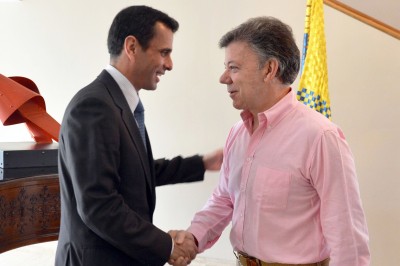Venezuela “Destabilization Plan”: Colombian Government Meets Venezuelan Opposition
"The principal conspiracies against our homeland have been hatched in Bogota": President Nicolas Maduro

In what has become a new diplomatic crisis in the region, the Maduro administration continued to criticize Colombian officials this week for a meeting held between Venezuelan opposition leader Henrique Capriles and President Juan Manuel Santos in Bogota on May 29th.
The encounter, which has threatened the strong ties that have characterized Colombian-Venezuelan relations since 2010, saw Santos receive Capriles, the right-wing governor of Miranda state and losing presidential candidate, for private talks that the Maduro government has characterized as “lamentable”.
“I’m very sorry that Santos is giving credence to the people who refuse to recognize Venezuela’s legitimate authority, and to the false idea that we can be overthrown, and the false ideas of the traitorous, fascist sectors of the Venezuelan right wing”, the Venezuelan President said in response to the meeting.
Capriles, who was beaten by Nicolas Maduro in Venezuela’s Colombian government’s meeting with Venezuelan opposition derails relations April 14th presidential elections, has failed to recognize his defeat, taking instead the reins of an opposition movement that has attempted to challenge the legitimacy of Maduro’s victory and the country’s electoral authorities. Capriles has said he is seeking international support to delegitimize Maduro’s presidency.
Venezuelan Foreign Minister Elias Jaua called the reception of such a controversial figure by the Santos government “a knife in the back”. “We have done everything we can to help find peace for the Colombian people. It’s not right that in Colombia they are promoting and legitimizing someone who openly refuses to acknowledge the institutions of the Venezuelan state”, Jaua said. The Venezuelan Minister referred to Capriles’ visit as part of a destabilization plan that involves mobilizing right-wing sectors of Colombian society to sow violence and chaos in the OPEC member state.
The same sentiment has been expressed by President Maduro, who has alleged that in Bogota “a situation of complete conspiracy” exists.
“We are neutralizing the plots against our country. It is well known that the principal conspiracies against our homeland have been hatched in Bogota. All of Venezuela knows this and we’ve given proof of it”, Maduro said.
For its part, the Santos administration has called the row a “misunderstanding” and has refused to comment on the meetings, calling for dialogue with the Venezuelan government instead of “microphone diplomacy”.
But as of earlier this week, efforts to mend the impasse had yet to be made by Colombia’s diplomatic corps.
“We haven’t had contact with [Foreign Minister Holguin] since Saturday. We are waiting for their communication to express the ideas that President Nicolas Maduro has asked me to transmit to the Colombian government”, Jaua said. According to Venezuela’s highest diplomat, these instructions include a complete revision of bilateral relations.
“Right now we are evaluating everything and all aspects of our relationship with Colombia until the Colombian government clarifies the reach that those who fail to recognize the [Venezuelan state’s] institutions have [in their country]”, Minister Jaua affirmed.
Last week’s row comes after years of diplomatic work had successfully rebuilt bilateral relations following the tensions that marked the governments of former Colombian President Alvaro Uribe and the late Hugo Chavez of Venezuela.
Santos’ replacement of Uribe as president in 2010 effectively began a new period in Venezuelan-Colombian relations that witnessed a warming in diplomatic ties and the signing of new multi-faceted agreements between the neighboring states.
The reception of Capriles by Santos, however, was a “breaking of the rules of the game” established between the two governments three years ago, President Maduro said.
“The Colombians who live in Venezuela understand Chavez’s democratic revolution and hopefully a way will be found so that truth and principles of respect can reconstruct the relations between our two governments”, the Venezuelan President stated.
Peace Process At Risk
Part of the political fallout that has accompanied the diplomatic breech has been the possible departure of Venezuela from the peace process underway in Cuba between Colombian authorities and the country’s FARC rebels.
As part of the policies of former President Hugo Chavez, Venezuela has been a guiding force and active mediator in the current talks taking place between the guerrillas and the government.
“Nobody can doubt the important role that the Bolivarian Republic of Venezuela has played and is playing in the search for peace in Colombia”, FARC leadership wrote in a blog on Saturday.
The statement additionally expressed the guerrilla group’s apprehension “over the acts which will without a doubt affect the extraordinary atmosphere of peace that we have been able to build through dialogue in Havana”.
Representatives of the Colombian government have similarly articulated the importance of Venezuela to the dialogue.
“The situation is very worrying… but I am hopeful that it will be overcome”, said Humberto de la Calle, the Santos administration’s chief negotiator.
Just prior the diplomatic crisis, the talks had yielded their most significant breakthrough in the past 6 months by outlining the basis for an agreement that would restructure land tenancy laws in the South American nation.
Meanwhile, the host nation of the peace process, Cuba, has expressed its complete support for the Maduro administration’s stance towards its neighbor.
“Cuba has had an unchanging position of solidarity with Venezuela and the recognition of it’s legitimate government headed by President Nicolas Maduro, whose decisive triumph on April 14th is an unquestionable expression of the sovereign will of the Venezuelan people”, said Cuban Foreign Minister Bruno Rodriguez.
The Minister referred to the international campaign being carried out against Venezuelan institutions “and any direct or indirect support for them” as “damaging to the unity of Latin American and the Caribbean. They undermine independence and hurt the efforts that Venezuela and other states have made for peace

